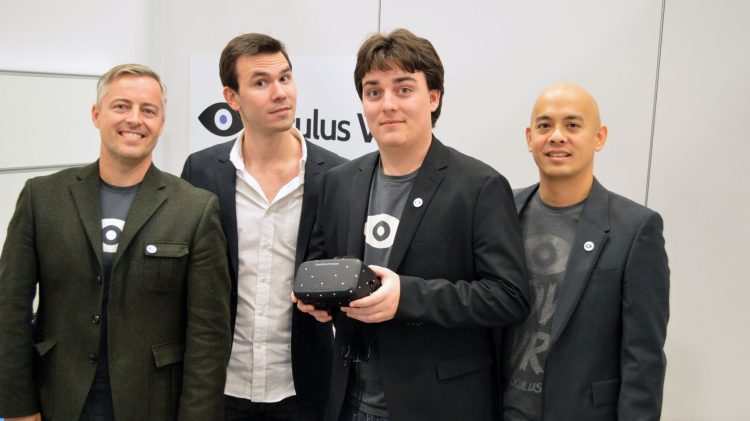Though the exact circumstances of Oculus VR founder Palmer Luckey’s March 2017 departure from Facebook have remained somewhat ambiguous, he’s now talking openly about the reason: He was fired after backing a pro-Trump group, a decision that left him with “hate and rage” towards Facebook. Yet he says he still supports his former company because he strongly wants virtual reality to succeed, and no one’s backing the technology more than “VR boy number one,” Facebook CEO Mark Zuckerberg.
Luckey shared his views on stage with interviewer Deirdre Bosa of CNBC during this week’s Collision 2019 conference in Toronto, noting that Zuckerberg bought into the company’s “crazy vision” that VR wasn’t just the “next major medium,” but rather “the final platform” for computing: a theory that once VR and augmented human vision technologies are perfected, anything else can be done within that platform. Zuckerberg, he said, has backed VR with more money and people than anyone in the world — “and I want him to keep doing that” — since Jeff Bezos and other billionaires are focused on their own technology passions, such as interplanetary exploration and colonization.
Despite recent suggestions that Zuckerberg should exit Facebook, Luckey deemed that “impossible” given his former boss’ status as chairman, CEO, and majority voting shareholder, suggesting “That’s not going to change anytime soon.” Even if Zuckerberg left, he said, replacing him wouldn’t solve Facebook’s issues:
I’m not a believer that in an organization like Facebook, or in a place like Silicon Valley, that you can just take one person out and plop one person in and solve anything. That’s not how these things work. These organizations operate on a much bigger scale than just one person’s decision making.
Luckey also downplayed the wisdom of a government-backed breakup of Facebook into smaller pieces, opining that doing so would disadvantage Western tech companies versus growing, under-regulated Chinese competitors that are prepared to replace their rivals with even lower ethical standards. “If you think that big tech in the West doesn’t care about privacy,” he said, “and doesn’t care about free speech, wait ’til you meet Chinese big tech, because they don’t care about any of that stuff.”
Following his departure from Facebook, Luckey founded Anduril, which now supplies the U.S. military with autonomous sensors and drones — a mission that other companies have shied away from based on ethical and technological concerns. He differentiated his work for the U.S. and its allies from what the Chinese and Russian militaries are doing, suggesting that as imperfect as the U.S. might be, it’s been on the right side of history, and needs support from bright tech minds:
I knew that we needed more companies with smart people and lots of investment, working to make sure that Russia and China don’t dictate the future of warfare. So they don’t dictate the norms behind how artificial intelligence is used by and how behind how cyber warfare tools are used.
Though Luckey was indelibly associated with Trump’s far-right presidential campaign, he suggests that his libertarian beliefs keep him from “building the boot that comes down on my neck in the long run.” Unlike the Chinese, who he said are trying to track every personal detail of every individual in the country, his autonomous systems focus more narrowly on threats, and providing the U.S. military with better information to make better decisions — fewer civilian deaths, less collateral damage, and getting bad guys more often.
But he conceded that there are “always unintended consequences” to developing military technology, which he largely dismissed, as he doesn’t think the U.S. will “accidentally end up being a totalitarian regime” misusing his products — voters, he said, wouldn’t allow it. “You have to make some steps towards allowing it to happen,” he said, causing Bosa to reply, “I think you could maybe debate that.”

